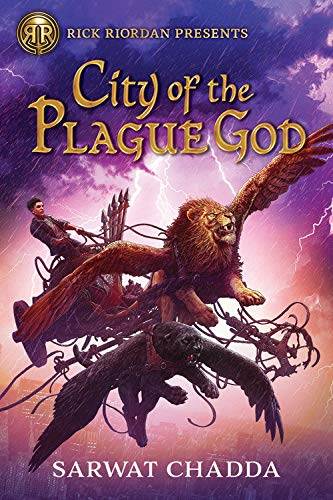Move over Zeus and Poseidon, there’s a new set of gods in town. The Rick Riordan Presents imprint at Disney Books brings a new year’s gift with author Sarwat Chadda’s City of the Plague God. In a publishing imprint devoted to telling the tales of world mythologies, City of the Plague God brings the reader to the world of a Manhattan teenager Sikander (Sik) Aziz and his Mesopotamian heritage.
Sik is an ordinary teenager with a boatload of personal issues. His brother Mo recently died, and Sik is left with the grief he holds for the older brother he admired, and a determination to help his parents cope by working in the family deli.
One night while closing the deli, Sik encounters some otherworldly creatures that attack him and destroy the family business. These demons are looking for a mysterious item that Mo brought back from Iraq. Confused as to whether he saw demons, Sik is further traumatized when his parents fall ill with a mysterious disease. Meeting up with a classmate named Belet, Sik learns that the disease his parents are suffering from is a result of Nergal, the ancient Mesopotamian god of plagues. Nergal sent the demons to the deli and Sik must stop the god of plagues or else the world will end. Partnering with Belet and her mother Ishtar the goddess of love and war, Sik is forced to fight for his survival and that of the city.
Manhattan descends into chaos as Nergal’s plague wreaks havoc on the population. Soon New Yorker’s are rotting scabs of monsters thirsting for flesh and blood, and Sik is forced to confront issues from his past and deal with his grief for his brother.
Sarwat Chadda must navigate a road well-travelled by past Rick Riordan Presents authors. Not only does Chadda start 2021 off with this rollicking fast paced trip through Mesopotamian mythology, he layers his story with truth of today’s life for an immigrant family.
City of the Plague God has amazing description with epic battles, including the resurrection of one of the greatest mythological heroes ever, Gilgamesh, but Chadda’s gift for the reader is humanizing the immigrant struggle, while combating racial stereotypes that have permeated pop culture and the news cycle. Chadda is teaching middle school students a lesson as he shines a light on racism as it exists for children today and showing them how they have the power to change this behavior.
Sik is an amazing character because of the personality that the author has crafted for his hero. Never one for a fight, Sik spends his time trying to be a good son and caring for his parents. Rather than having a transformative moment that turns the teenager into a lean mean fighting machine, one of the highpoints of the story is when Sik reconciles with his brother which will leave readers with tears in their eyes.
Not only will readers feel the emotion and hurt that Sik has tried to bury, we will experience the hurt and pain of what this young boy experiences in his daily life. While his parents remember their life in Iraq and share their history with Mo, Sik never had a life in Iraq. To Sik, he isn’t Iraqi, but a New Yorker and Iraq is a distant country that has no bond with him. To his parents, that was the home they were forced to leave.
The emotional pain of losing his brother and trying to please his parents is not the only kind of real-world emotion readers are going to get from City of the Plague God. The racism that Sik deals with every day is background noise of daily life. To Sik, it’s so common that he doesn’t see it as anything shocking. Witnessing what this boy experiences should be appalling to the reader. When the city descends into chaos thanks to Nergal’s plague, the first target of the mob mentality was the family deli. Racial insults were sprayed on the deli, with the windows smashed and the interior destroyed.
At school when Sik is talking with Belet, a bully named Zack refers to Sik as a raghead and tells his moronic followers to steer clear of Sik because he might have ebola. I cannot imagine at any point in my life where kids would experience this type of hatred that these insults could be regulated as just part of everyday life. For Sik to survive in the world, he must normalize other people’s prejudice. How many kids must do this today to live their lives? Too many!
Sarwat Chadda has taken on prejudice and bigotry in City of the Plague God but he also gets to show readers the life of a teenaged Muslim boy and how his traditions and customs are no different than anyone else. Chadda also takes the step to humanize the gods with a short backstory about the life of Ishtar. In other mythological middle grade novels, we meet indifferent and aloof gods, but with Ishtar, we see a person in the divine form. There are lovely moments of personality and rage as Ishtar defends a French town from Nazi attack during World War II. We see the goddess of war and love in this scene. The moment Sik discovers all the pictures of the orphan children Ishtar has adopted throughout the centuries, readers can feel the motherly love that Ishtar has and has shown to countless people.
City of the Plague God is a four-star book for its rich narrative and characters that Sarwat Chadda has added to the Rick Riordan Presents imprint. Not only will readers of any age be entertained by the narrative, learn to admire Gilgamesh, wish they had a talking sword like Kasusu, but also learn about what prejudice and racism awaits so many people in the world today. There are more tales to be told with Sikander Aziz, Belet, and Gilgamesh, and I cannot wait for more.

